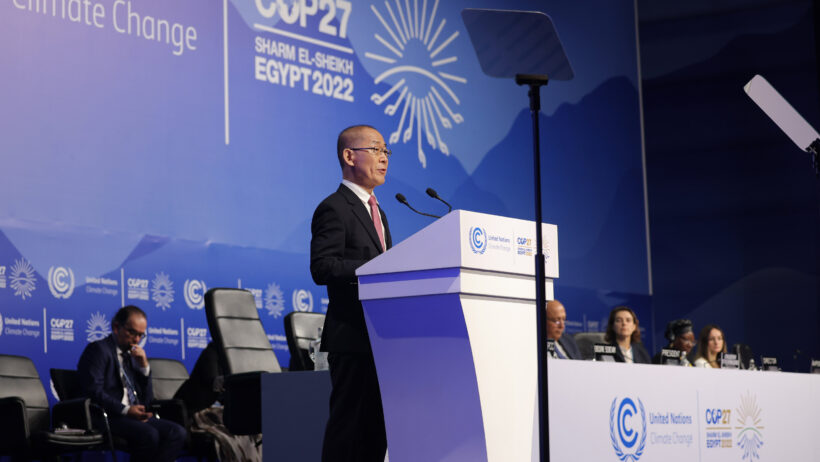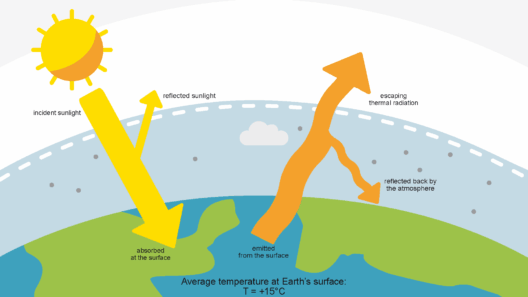The phenomenon of global warming has escalated to a pivotal concern, not merely for its implications on the planet’s temperature, but its far-reaching impacts on air quality. As carbon emissions rise and atmospheric conditions change, the air we breathe is increasingly compromised. This discourse delves into the multifaceted relationship between global warming and air quality, emphasizing the consequences, causes, and potential solutions.
First, it is essential to delineate how global warming exacerbates air pollution. Rising temperatures enhance the formation of ground-level ozone, a noxious pollutant that arises from chemical reactions between volatile organic compounds (VOCs) and nitrogen oxides in the presence of sunlight. Consequently, urban areas, often plagued with high traffic and industrial activity, experience deteriorating air quality during warmer months, leading to an increase in respiratory ailments such as asthma and chronic obstructive pulmonary disease (COPD).
Moreover, elevated temperatures can exacerbate wildfires. The Intergovernmental Panel on Climate Change (IPCC) underscores that hotter, drier conditions foster the ignition and spread of wildfires, releasing significant quantities of smoke and particulate matter into the atmosphere. This phenomenon not only obliterates breathing air quality across vast regions but also poses severe health risks to vulnerable populations, particularly the elderly and those with pre-existing conditions.
In addition to ozone and wildfire smoke, increased temperatures facilitate the exacerbation of other pollutants. For instance, aerosol formation is highly sensitive to temperature fluctuations. Higher temperatures can intensify the emissions of secondary organic aerosols, contributing to smog formation and respiratory difficulties. Consequently, air quality in both urban and rural settings might decline, even as industrial emissions are seemingly under control.
Climate change is also precipitating a shift in weather patterns, which bears implications for atmospheric stability. Increased frequency and intensity of extreme weather events, such as hurricanes and floods, can destabilize air quality. Heavy rainfall can lead to the mobilization of pollutants from contaminated sites, while hurricanes can disperse air pollutants over extensive areas. Thus, the interconnections between climate and air quality are further complicated by the feedback loops inherent in these phenomena.
Transitioning to the broader implications of diminishing air quality, the socio-economic ramifications cannot be understated. Individuals residing in areas with poor air quality face increased healthcare costs, resulting from the treatment of pollution-induced illnesses. This burden disproportionately affects low-income communities, which often lack the resources to move away from polluted areas or to access advanced healthcare services. The result is a grave inequity that further entrenches systemic disadvantages, leading to what many advocates regard as an environmental justice crisis.
A significant concern lies in the potential long-term effects of degraded air quality, particularly on children. Attention has been drawn to studies indicating the correlation between exposure to air pollution and cognitive impairments in developing children. These findings illustrate that poor air quality not only affects respiratory health but also poses threats to educational outcomes and, by extension, societal advancement.
Efforts to ameliorate air quality in the context of global warming are imperative. Policy change plays a crucial role in this regard. Implementing stringent regulations on emissions from industrial sources and vehicles is paramount. Legislative frameworks must ensure an ambitious transition towards renewable energy sources, as fossil fuel combustion remains a significant contributor to both global warming and air quality deterioration.
Additionally, urban planning can play a transformative role in alleviating air pollution. Encouraging green spaces, promoting public transportation, and enhancing energy efficiency in buildings can contribute to improved air quality. Strategic urban development not only reduces emissions but also facilitates community well-being by providing residents with cleaner air and healthier environments.
Public awareness campaigns also serve as a crucial instrument in the fight against deteriorating air quality amid rising global temperatures. Educating communities about the sources and impacts of air pollution enables citizens to advocate for their own health and well-being. Grassroots movements have illustrated the power of collective action in effecting change, drawing attention to air quality issues and demanding accountability from corporations and policymakers alike.
International cooperation is another necessary avenue as air quality knows no borders. Air pollution is a transboundary issue; hence, collaborative efforts must be made to address it holistically. Agreements aimed at reducing emissions on a global scale are vital, as they encourage countries to work together to devise innovative solutions and share best practices in air quality management.
In conclusion, the intricate interplay between global warming and air quality is a pivotal issue demanding urgent attention. The ramifications of declining air quality reach far beyond environmental concerns; they encapsulate health, socioeconomic equity, and global cooperation. To safeguard the air we share, a multi-pronged approach encompassing policy change, public awareness, and international collaboration is necessary. The time to act is now, for the air we breathe is an inextricable element of our existence—its quality directly influences our health, our environments, and ultimately, our future.







